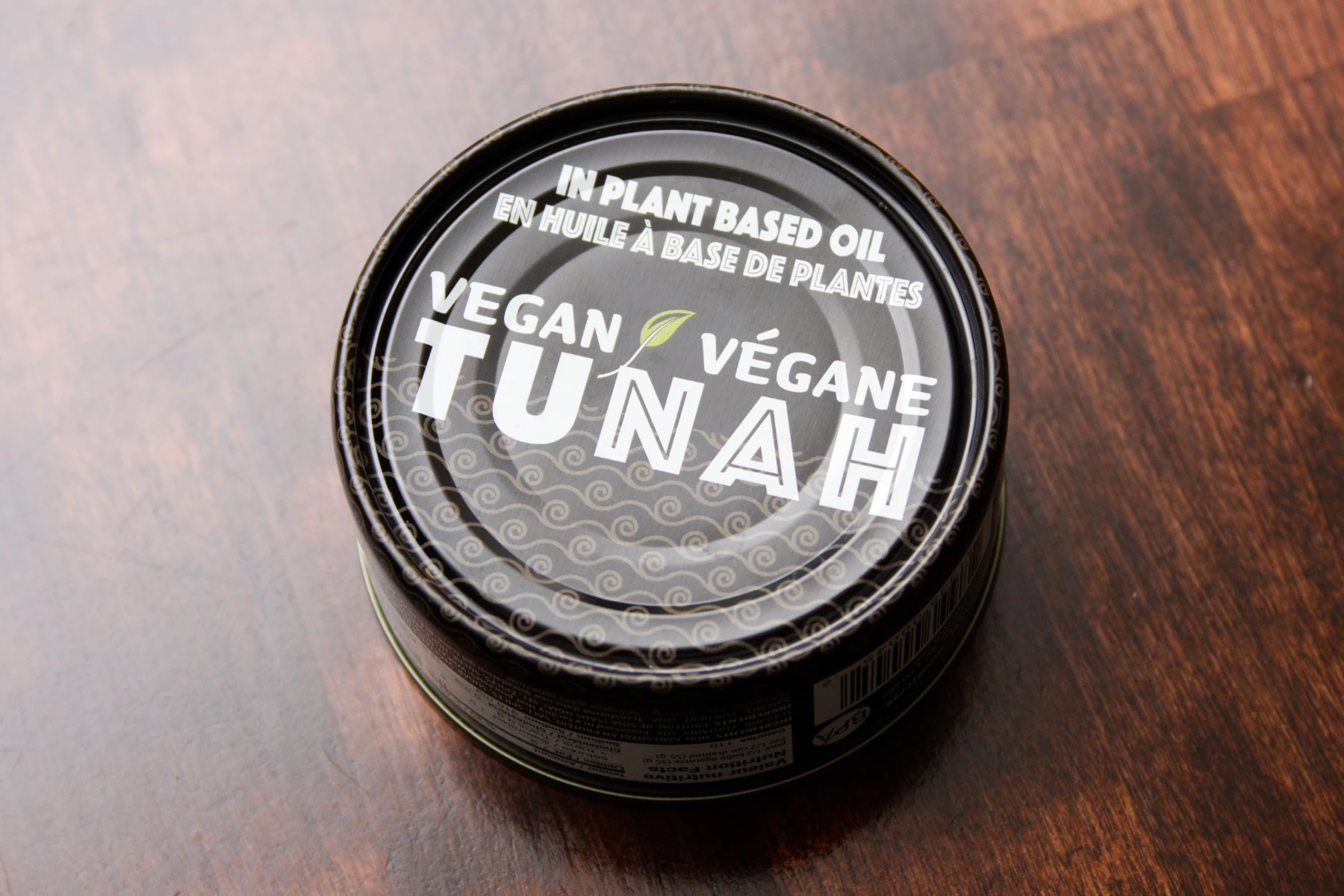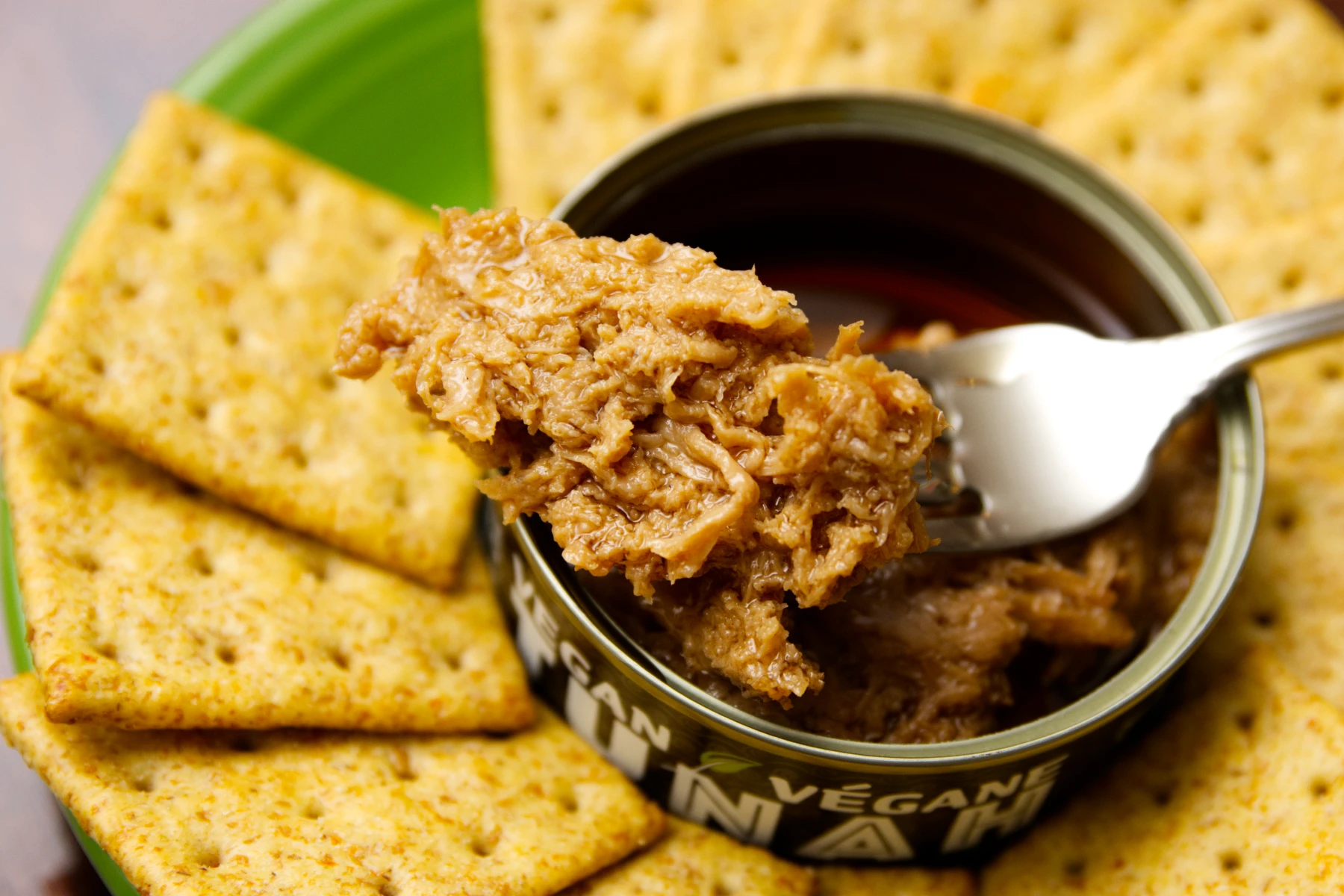Urbani Vegan Tunah
We're Going VEGAN!
Originally Published: Monday, April 1, 2024
Specs
 Play us a tun-ah.
Play us a tun-ah.Could’ve Fooled Me
What better way to celebrate the First of April than the exciting announcement that this blog will now transition its focus to feature solely vegan canned food? That’s right, this blog is going VEG!
Today’s featured product, and the first step on our stairway to veganism is Vegan Tunah from Urbani Foods, a Canadian natural food brand based out of my home province of British Columbia. Although the brand is based in Canada, the product is imported from elsewhere. It doesn’t say from where on the can, but I have my suspicions.
Urbani Foods is a manufacturer and importer of various natural foods, with a focus on plant-based and non-GMO products. Their Vegan Tunah label of tuna replacement promises an experience akin to the real thing.
They offer tunah in a few different flavours. Today’s review is their original flavour, with no added bells and whistles. This should be the most neutral presentation of their product and hopefully give me the most unadulterated experience.
The product retails for about $5 CAD for a 150 gram can, not cheap but still affordable. It’s just a tad higher than the price of a mid-tier tuna can from my local grocer.
Tunah Fishin’
 Something smells fishy, but barely.
Something smells fishy, but barely.Opening the can was as simple as pulling the ring up and back to pop the top off while being careful not to cut yourself on the sharp edge of the lid and not spilling any of the contents all over your white pants which definitely didn’t happen to me.
The can was filled with chunks of tunah bathed in an amber-hued oil. The appearance of the tunah chunks definitely passed the test and they looked almost exactly like tuna, down to the pinkish hue and the flakey texture.
The product smelled surprisingly like a can of fish, with a bit of briny funk. The scent was subtler, but reminded me enough of the real thing that I did a double-take.
Fish-ish
 Catfished by a vegan.
Catfished by a vegan.The texture of the tunah was more cohesive than its appearance suggested. I poked my fork into a larger chunk and was not able to dissect it into smaller flakes easily; the texture was bouncy and stretchy, as opposed to flakey.
I did my best to transfer a small piece of tunah onto a cracker and started the taste test. The texture was a bit chewy, but not rubbery, and definitely not flakey. There was a nice amount of moisture from soaking in oil which allowed it to remain tender. While the texture wasn’t a perfect match to the real thing, it could easily be mistaken for some other type of animal protein.
Where the imitation fell apart was in the taste, as the tunah tasted almost nothing like real fish. However, it was quite yummy despite tasting nothing like tuna. It wasn’t overly salty but had a nice amount of umami from the seasoning and the soy proteins and each bite ended with a bit of sweetness. There was no fishiness to the tunah so it didn’t taste like it was dragged out of the sea.
The flavour was not overly strong, and I could see this product being a good substitute for tuna in recipes that call for it because of that. I would probably compensate on the salt levels a bit since tuna tends to be a bit saltier and brinier.
The Fish of April
 Go ahead, take a bite. You might be fooled into believing this is the real deal.
Go ahead, take a bite. You might be fooled into believing this is the real deal.I was told recently that Fish of April meant something in French, but I can’t remember what. I’m sure it will come to me tomorrow.
As for the Tunah, I was pleasantly surprised by how tasty it was. It is unmistakeably not tuna, but it works fantastically as its own thing, and I can see it in a sandwich or casserole in place of the fish. The product reminds me a lot of Seitan (麵筋; Wheat Gluten) which is a staple in many vegetarian or vegan Asian diets and something I grew up eating a lot of.
Unfortunately, as with any specialty food items, the price isn’t the most approachable, especially if you might have doubts about exploring plant-based products. The Vegan Tunah gets a surprising but unequivocal Yum, but no value stars. I still recommend giving it a shot though, especially for the veggie-curious.